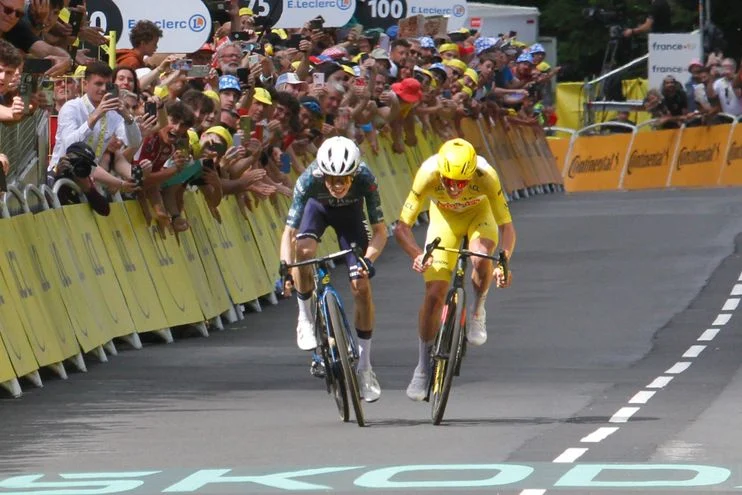
In the world of professional cycling, where every pedal stroke is scrutinized and every victory is dissected, few riders have faced as much intense scrutiny as Jonas Vingegaard. The Danish cyclist, who ascended to fame with his remarkable performances in the Tour de France, has not only won the hearts of many fans but also attracted a fair share of criticism. Some argue that this backlash is warranted; others contend that Vingegaard faces undue criticism that undermines his achievements and the sport itself.
A Rising Star
Jonas Vingegaard burst onto the scene during the 2021 Tour de France, where he proved himself to be a formidable competitor, ultimately finishing second overall. His stunning performance during the 2022 Tour, where he claimed victory, solidified his status as one of cycling’s elite. However, with success often comes scrutiny, and Vingegaard’s career has not been without its share of controversy.
Critics have targeted various aspects of Vingegaard’s performance, from his riding style to his team tactics. Some detractors argue that he benefits from the strength of his Jumbo-Visma team, suggesting that his success is less about individual talent and more about the collective power of his teammates. This argument raises the question: should success in cycling be attributed solely to individual prowess, or is it a product of team dynamics?
The Nature of Criticism
Criticism in sports is nothing new. Every athlete, from the underdog to the champion, faces some form of critique. However, the intensity and nature of the criticism aimed at Vingegaard have sparked debate. Some of his critics have taken to social media platforms, where they often express their discontent with pointed remarks that can verge on personal attacks. This raises concerns about the role of social media in shaping public perception and its impact on athletes’ mental health.
Furthermore, Vingegaard’s reserved personality contrasts sharply with the more flamboyant styles of some of his contemporaries, such as Tadej Pogačar. While some fans appreciate Vingegaard’s calm demeanor and focused approach, others perceive it as a lack of charisma or engagement with the sport’s fanbase. This perception has led to accusations that he lacks the “star quality” needed to be a leading figure in cycling, further compounding the criticism he faces.
Performance Under Pressure
One of the most critical aspects of Vingegaard’s career has been his performance in high-pressure situations. In the 2023 Tour de France, despite being the reigning champion, he faced challenges that many believe revealed cracks in his armor. Some critics argue that his inability to maintain a dominant position throughout the race is indicative of a deeper issue, suggesting that he is not equipped to handle the pressures of being a favorite.
However, it is essential to recognize that the dynamics of professional cycling are complex. The unpredictable nature of the sport, characterized by weather conditions, injuries, and strategic maneuvering, can dramatically affect outcomes. Rather than placing undue blame on Vingegaard, it might be more productive to view these setbacks as part of the sport’s inherent unpredictability.
The Role of Media Narratives
The media plays a significant role in shaping public opinion about athletes. In Vingegaard’s case, narratives often focus on his rivalry with Pogačar and other elite cyclists, sometimes portraying him as a lesser talent. This “us versus them” mentality can detract from the nuances of each athlete’s abilities and contributions to the sport.
Moreover, sensationalist reporting can lead to misconceptions about Vingegaard’s skills and strategies. When cycling journalists focus on dramatic moments rather than comprehensive analyses of races, it creates a skewed perception of an athlete’s capabilities. This trend not only affects how fans view Vingegaard but also places unnecessary pressure on him to constantly prove his worth.
A Call for Balanced Critique
While it is essential for athletes to be held accountable for their performances, it is equally important to foster an environment where criticism is fair and constructive. Jonas Vingegaard, like all elite athletes, is human and subject to the same pressures and challenges as anyone else. The cycling community must strive for a more balanced approach to critique that acknowledges both the complexities of the sport and the individual achievements of its competitors.
Criticism should be rooted in a genuine understanding of the sport rather than personal biases or fleeting media narratives. Supporters and critics alike should recognize the extraordinary skill required to compete at the highest level and appreciate Vingegaard’s contributions to cycling, regardless of the outcome of any given race.
Conclusion
In conclusion, while Jonas Vingegaard’s rise to prominence has not been devoid of criticism, much of it seems to stem from a combination of media narratives, unrealistic expectations, and the natural rivalry that defines professional sports. Rather than viewing his struggles as failures, fans and commentators should appreciate the talent and hard work that underpin his achievements. The cycling community would benefit from embracing a culture that recognizes the complexities of the sport and fosters respectful dialogue, allowing athletes like Vingegaard to thrive without the weight of unnecessary criticism.





